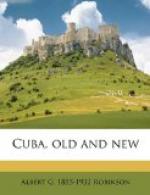[Illustration: A SPANISH BLOCK HOUSE]
The excitement of the Lopez incident was passing when it was revived, in 1854, by the Black Warrior experience, to which reference is made elsewhere. Another invasion was projected by exuberant and adventurous Americans. It was to sail from New Orleans under command of General Quitman, a former Governor of the State of Mississippi. No secret was made of the expedition, and Quitman openly boasted of his purposes, in Washington. The reports having reached the White House, President Pierce issued a proclamation warning “all persons, citizens of the United States and others residing therein” that the General Government would not fail to prosecute with due energy all those who presumed to disregard the laws of the land and our treaty obligations. He charged all officers of the United States to exert all their lawful power to maintain the authority and preserve the peace of the country. Quitman was arrested, and put under bonds to respect the neutrality laws. There was a limited uprising in Puerto Principe, in 1851, and a conspiracy was revealed, in Pinar del Rio, in 1852. A few years later the Liberal Club in Havana and the Cuban Junta in New York were reported as raising money and organizing expeditions. Some sailed, but they accomplished little, except as the activities appear as a manifestation of the persistent opposition on the part of what was probably only a small minority of the Cuban people. For several years, the unrest and the agitation continued. Spain’s blindness to the situation is puzzling. In his Cuba and International Relations, Mr. Callahan says: “Spain, after squandering a continent, had still clung tenaciously to Cuba; and the changing governments which had been born (in Spain) only to be strangled, held her with a taxing hand. While England had allowed her colonies to rule themselves, Spain had persisted in keeping Cuba in the same state of tutelage that existed when she was the greatest power in the world, and when the idea of colonial rights had not developed.” In Tomorrow in Cuba, Mr. Pepper notes that “though the conception of colonial home rule for Cuba was non-existent among the Spanish statesmen of that day, the perception of it was clear on the part of the thinking people of the island. The educated and wealthy Cubans who in 1865 formed themselves




